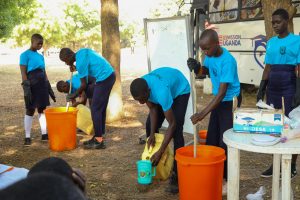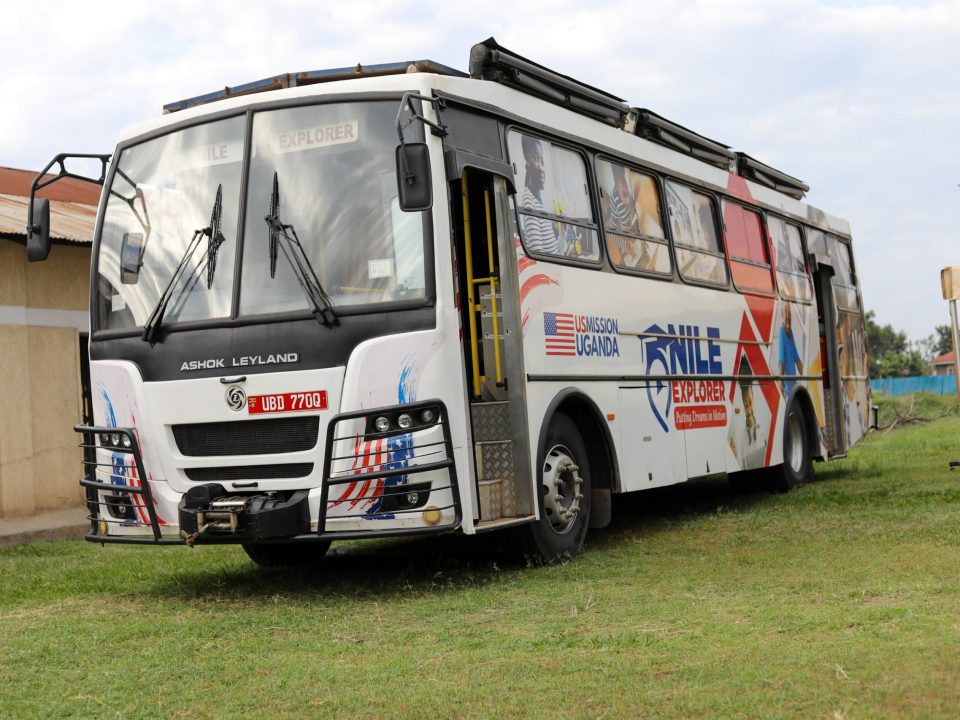
Addressing School Gender-Based Violence in Northern Uganda: A Journey of Change with the Nile Explorer Mobile Classroom
July 9, 2024
Powered by Purpose:The Nile Explorer Takes Future-Ready Learning to Western Uganda
June 6, 2025Pakwach District in Uganda is facing major hygiene and sanitation issues, posing a significant public health risk. The District Health Office reports that only 42.3% of homes have handwashing facilities, while latrine coverage continues at 73.9%. In sub-counties such as Wadelai and Panyango, the figures fall even lower, at 61.5% and 63.0%, respectively. These deficiencies in sanitation systems contribute to the spread of waterborne infections including bilharzia (schistosomiasis), which has sickened over 55,000 people. Panyimur Town Council has an alarmingly high bilharzia prevalence rate of 73.4%, with Pakwach Sub County following closely at 57.7%. Open defecation, especially around riverbanks and landing areas, increases the situation, making disease transmission even more widespread.
While initiatives like the 2020 “Environment and Sanitation Ordinance” have required homes to build better latrines and install handwashing stations, the availability of basic hygiene essentials, such as soap, remains a challenge. Without soap, handwashing reduces its effectiveness in preventing infections, making populations susceptible.
The Nile Explorer Bus Driving Change Through Practical Solutions
Recognizing the importance of addressing hygiene barriers, the Nile Explorer Bus stepped in to provide students of Nam High School and Martyr’s College Pakwach with practical skills that not only enhance sanitation but also empower them to become change agents in their communities. One of these transformative efforts is a liquid soap-making session, in which students learn how to make an important hygiene product from scratch.

Students mixing liquid soap
This hands-on training session is more than just a lesson in soap production, it is a solution to a pressing health challenge. By learning how to make liquid soap, students can introduce affordable, homemade hygiene products into their homes and schools, fostering a culture of regular handwashing. This small but powerful step plays a crucial role in preventing infections, reducing disease transmission, and promoting overall public health in Pakwach.
The impact of the Nile Explorer Bus extends beyond hygiene education. Liquid soap-making also serves as an income-generating skill that can uplift families and the communities in Pakwach economically. Students can turn their newfound knowledge into a small-scale business by selling homemade soap, making hygiene products more accessible while creating financial opportunities for themselves and their families.
This initiative fosters a sense of entrepreneurship, resilience, and self-reliance, equipping young people with the tools they need to drive socio-economic transformation in their communities. By connecting hygiene education with sustainable income streams, the Nile Explorer Bus is not only improving health outcomes but also inspiring students to become leaders of change in Pakwach.
The Nile Explorer Bus continues to traverse Uganda, equipping students with STEM knowledge, Civic education, life skills, and health education to drive lasting impact




